B2B eCommerce is expected to reach $1.8 trillion in the United States by 2023. Experts predict that it will be growing annually by 10% over the next five years.
The explanation of such a growth is simple: modern young businessmen are used to shopping online and they want to purchase products for their companies quickly and hassle-free like they shop for themselves. B2B online stores free entrepreneurs from time-consuming purchasing routine.
If you plan to launch a B2B eCommerce website for your business, start with choosing a reliable software platform for it. For now, there are about 40 B2B eCommerce solutions out there that are worth your attention. We have analysed all of them and picked 5 most functional and balanced.
What Features are Essential for a Reliable B2B eCommerce CMS?
B2B eCommerce demands special functionality that helps to automate the purchasing process for companies and communication with them. While usual B2C eCommerce features greatly work for B2B online stores, you will still need B2B-specific functionality. So, when choosing a B2B eCommerce platform, make sure it has these features at least:
- In-bulk product ordering
- Individual prices for different customer groups and levels
- Multiple users in one customer account with different roles
- Price list management system
- Powerful API for integrating your store with 3rd-party applications
- Closed storefront for unauthorized users
- Easy reordering
- Convenient order placement
- Hybrid eCommerce to run B2B and B2C sales simultaneously
1. CS-Cart B2B & B2C (Capterra: 4.6 out of 5)
CS-Cart was released to the public in 2005 as a B2C online store platform based on PHP. The company now offers several eCommerce solutions including a B2B downloadable software. CS-Cart focuses on rich functionality and simplicity.
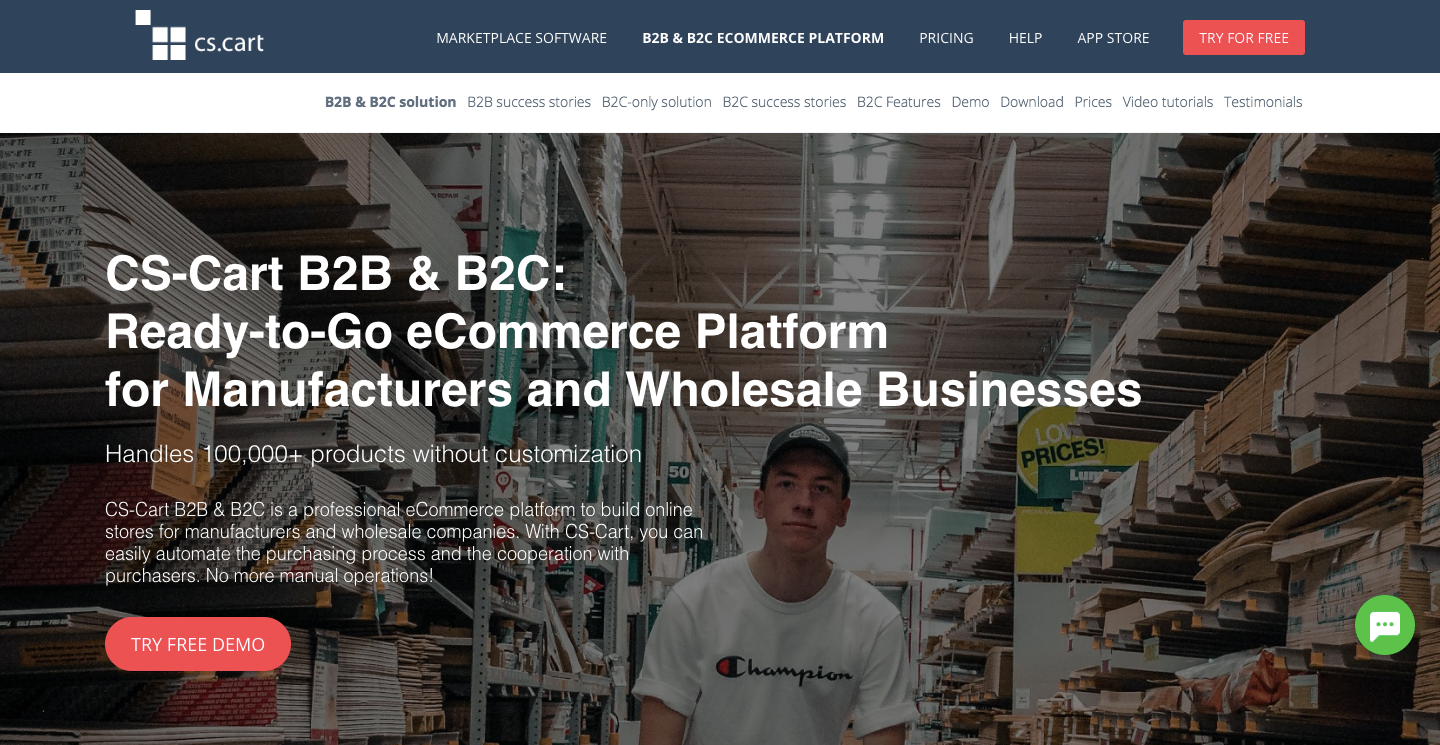
All the CS-Cart eCommerce solutions are known for their feature richness, and the B2B product is no exception. This software includes all the features from the above list, plus more B2C-specific functions that greatly work for B2B as well. CS-Cart’s flexible API allows you to integrate the store with any third-party business system such as CRM, ERP, analytics, and more.
One of the advantages of CS-Cart B2B & B2C over other platforms is that you can run hybrid business. You can sell to B2B and B2C customers on different storefronts. The multi-store feature allows you to create multiple storefronts and configure them independently for B2B and B2C commerce.
CS-Cart B2B & B2C is a downloadable software, which means you need to install it on your own (or rented) server. Its self-hosted nature gives you absolute freedom to tweak the platform, modify its code, and customize it. You pay only once for the lifetime license.
On the upside: The ease of use, feature richness, and reasonable price (one-time fee). Users love CS-Cart’s clean architecture and open source code.
On the downside: The default storefront design doesn’t meet modern standards. There are complaints about a complicated upgrade process if the store is heavily customized and the server configuration is wrong.
2. Pepperi (Capterra: 4.4 out of 5)
Pepperi is a cloud-based B2B platform for big wholesale companies, manufacturers, and enterprises. It’s easy and quick to start a store on Pepperi but it gives you less freedom in terms of customization because it is SaaS.
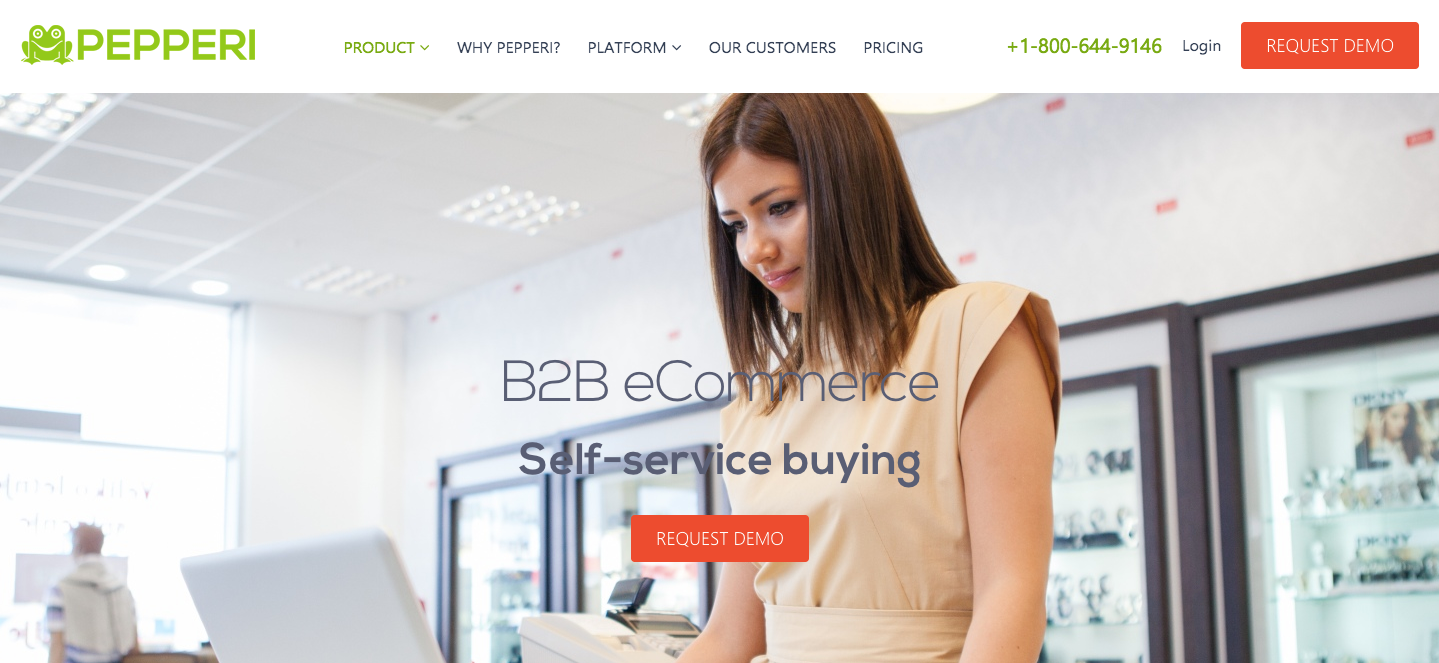
Pepperi is known for its mobile friendliness: they offer native mobile apps for Android and iOS. The cool thing about it is that you can use the app offline: you can work with the store date and synchronize later. Users also mention that Pepperi has a great web interface as well.
It’s an omni-channel B2B solution that easily integrates with CRM and ERP systems through a flexible API. It has lots of built-in features to offer B2C-like experience for wholesale customers: awesome catalog design, popular payment and shipping options, prices based on customer tiers, price list management, notifications, and more.
On the upside: Mobile friendliness, great set of B2B functions, convenient design and layout.
On the downside: Users are satisfied with Pepperi in general, but some report terrible customer support that is not available on Friday and Saturday and laggy interface.
3. BigCommerce B2B Ecommerce (Capterra: 4.3 out of 5)
The key features of BigCommerce are a powerful API, the ability to run a hybrid business (B2B and B2C), and ease of use. It’s quite a young platform but a popular platform.
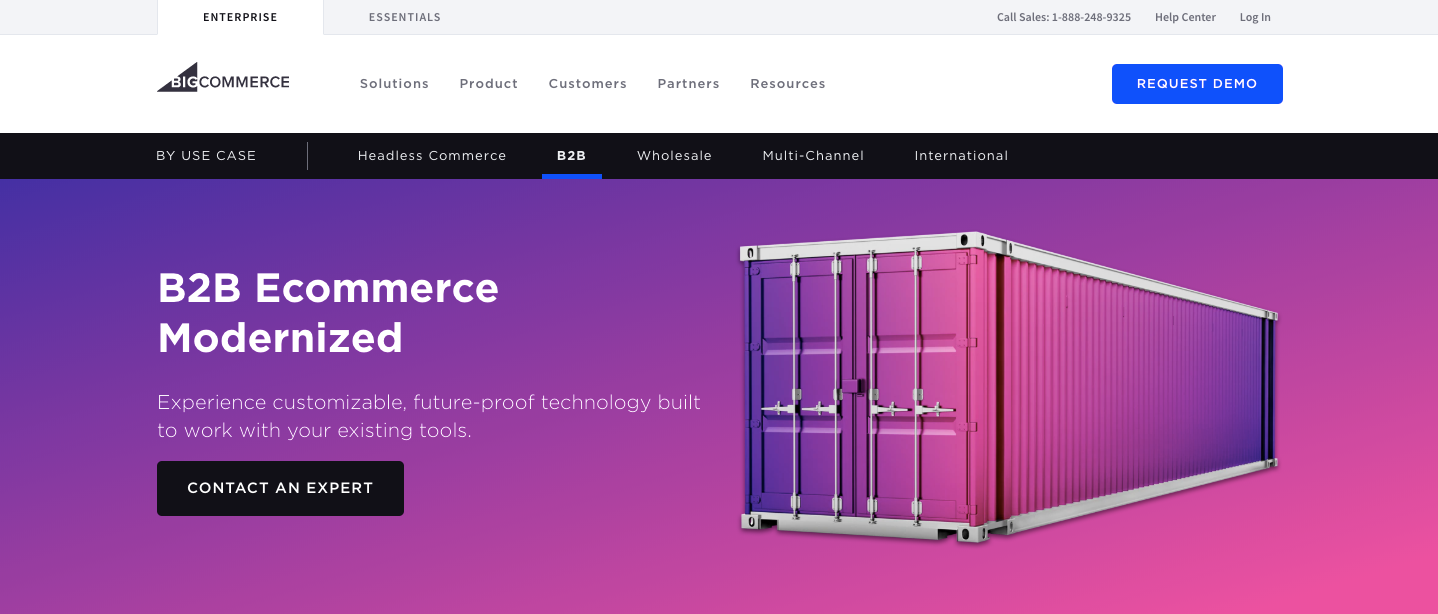
BigCommerce offers the ability to run a hybrid B2B and B2C business. You can create customer groups with different privileges dividing them into companies and individuals. But unlike CS-Cart, BigCommerce only lets you sell to both groups through the same storefront.
Its cloud-based model doesn’t give users much freedom in customization, really. You need to pay monthly for using BigCommerce. The company can increase the payment anytime and you will have to pay anyway to keep your B2B site up and running. This is a downside of all SaaS solutions, so if you go for SaaS, make sure the company is reliable.
On the upside: BigCommerce is easy to use and has a short learning curve. Rich documentation greatly helps beginners to learn the platform. Users also appreciate the platform’s feature richness.
On the downside: Users say that BigCommerce is an excellent solution only for beginners and small businesses. There are also lots of user complaints about bad customer service.
4. 3dcart B2B eCommerce Solution (Capterra: 4.4 out of 5)
3dcart offers B2B and B2C solutions. Their B2B product is cloud-based: it’s easy to start a store but it’s never fully under your control. Plus, customization is quite limited.
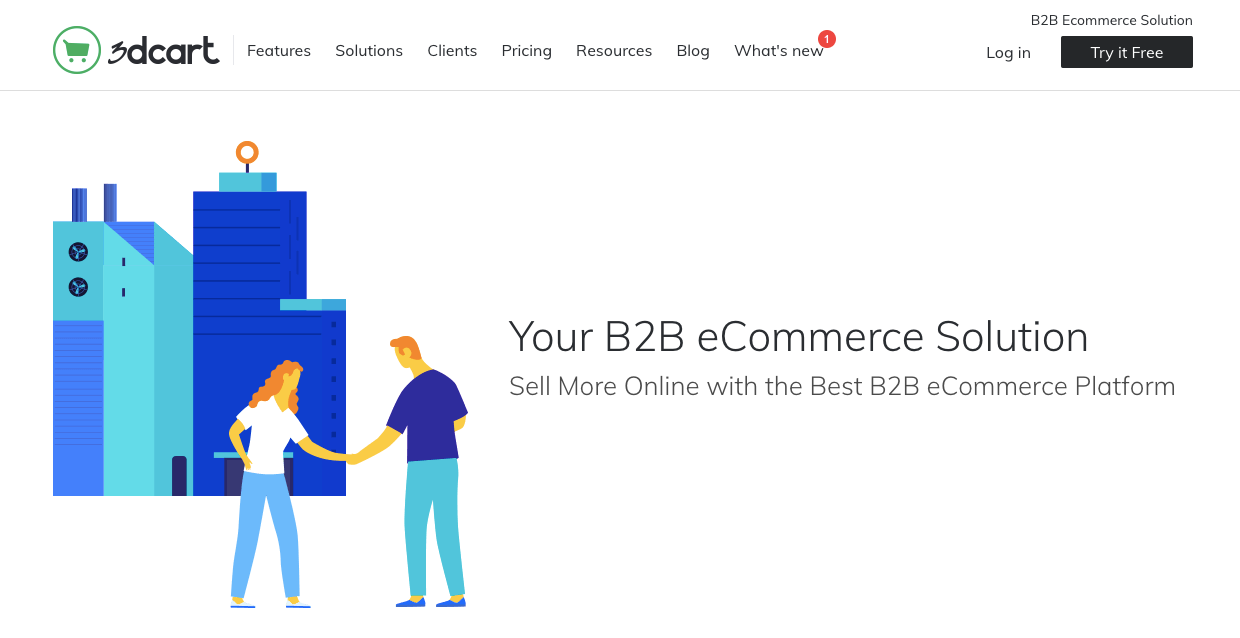
The cool thing about 3dcart is that it has almost all the features for B2B customers mentioned in the “must-have” list except for multiple storefronts and advanced price list management features. You can’t run separate storefront for B2B and B2C commerce but you can sell to B2C customers from the same website, which is also good.
On the upside: Lots of B2C and B2B-specific functions, quick and easy start due to its cloud nature.
On the downside: Users complain about 3dcart’s customer service. Looks like some of the even lost money because of the unqualified 3dcart support staff. Well, there isn’t perfect customer service, is there?
5. SAP Commerce Cloud (Capterra: 4.6 out of 5)
SAP offers multiple applications for businesses: CRM, ERP, HR management, network and spend management, business technology platform, and, of course, B2B eCommerce CMS. It’s a complex software that meets the requirements of the modern B2B segment. Although the platform is cloud-based, it offers integration capabilities, which means it can be scaled.
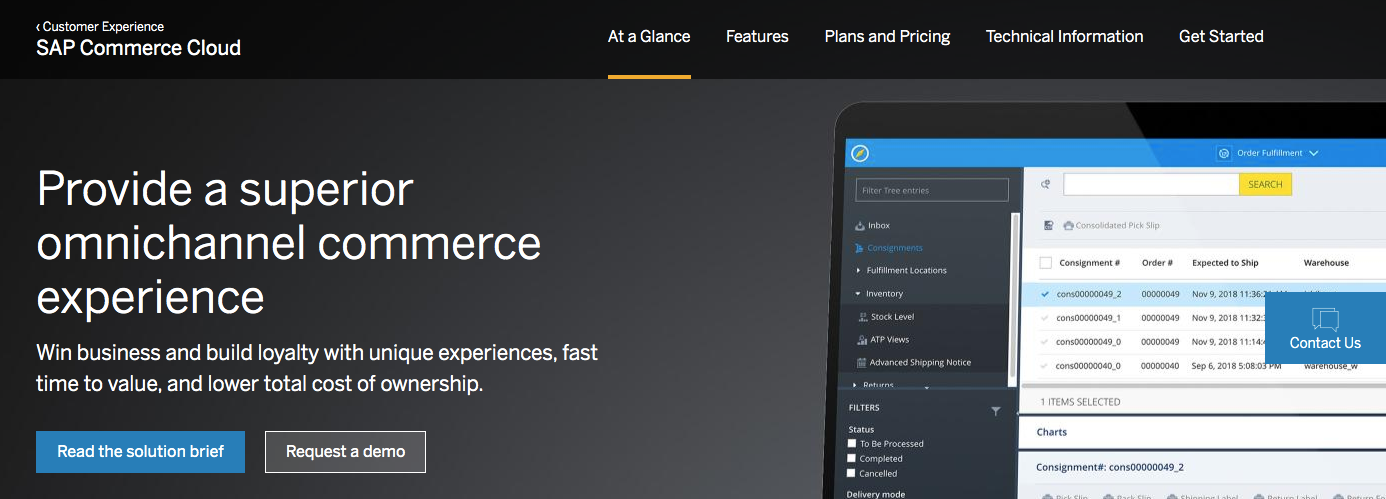
SAP Commerce Cloud can be used to build B2C, B2B, B2X, and hybrid online stores for manufacturers, wholesalers, and big distributors. The platform includes all the essential B2C functions such as cart checkout, product content and experience management, promotions, and order management, and other.
There’s not much info about the platform’s B2B-specific functionality on their website but with SAP you can definitely create a webstore to sell to both direct customers and companies. Thanks to its integration capabilities, you can connect various business applications to the store, but what’s more important—the platform perfectly connects with other SAP’s homegrown applications. It’s a pity there’s no multi-store feature, so you will sell to B2C and B2B purchasers from the same storefront.
On the upside: Powerful marketing and customer relationship management, ease of building a fully working eCommerce store in no time, great integration capabilities.
On the downside: Users report that the system is quite closed and it’s hard to find advice on forums or anywhere on the web. SAP Commerce Cloud is a SaaS solution, which means you’ll have to pay for it monthly. And some users say that the price is too high for the set of available features.
What to do next?
All of the platforms provide demos, so you should carefully test every solution starting from CS-Cart B2B & B2C and choose the one that fits your business goals just fine. Just keep in mind that there’s no perfect software for your B2B eCommerce site—you will have to adapt any of them to your business processes. Make sure the platform is customizable and scalable.
Author: Stella Lincoln
I am Stella Lincoln having a master degree from the University of California, Los Angeles in the subject of marketing. I love to spread the knowledge and wisdom. My focus is to enhance my skills and reduce the gap. You can check my write-ups at my blog; Educator House. Nowadays, I am working in HarperCollins Publishers as a Writing Consultant.